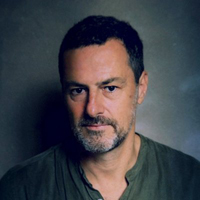Carlo Pizzati: Writing while living an idyllic existence in India
View(s): Carlo Pizzati has woven himself into the social fabric in Paramankeni, a coastal fishermen’s village south of Chennai, where he has ‘gone native’. Here he lives with his wife Tishani Doshi, the poet, writer and dancer who earned him the pet name of “India’s Italian son-in-law”- a title the Indian newspapers seem to delight in whenever he hits the literary news.
Carlo Pizzati has woven himself into the social fabric in Paramankeni, a coastal fishermen’s village south of Chennai, where he has ‘gone native’. Here he lives with his wife Tishani Doshi, the poet, writer and dancer who earned him the pet name of “India’s Italian son-in-law”- a title the Indian newspapers seem to delight in whenever he hits the literary news.
For “Mappillai – an Italian son-in-law in India” was the title of his memoirs of living in India. The book has been said to offer “an intimate capsule of contemporary Indian history—of the concomitant Hinduization and Westernization of India, intertwined with the Indianization of a European”.
Swiss-born Carlo began as a journalist. For 16 years he wrote for the major Italian daily newspaper La Repubblica, writing stories of crisis from New York, Northern Ireland, Rome, Mexico city and Buenos Aires. From his current base in Chennai he writes about Asia for the Italian national daily La Stampa and cultural essays and editorials for the Indian national daily The Hindu.
Apart from ‘Mappillai’, Carlo has written two other non-fiction books, two novels and a collection of short stories. “Technoshamans” is a humorous, illuminating non-fiction book in which the author roams the world searching for places where technology and spirituality intersect. The prosaic (if not irreverent) driving force of the book was actually the narrator’s quest for relief for a bad back which has tortured him for 20 years. According to Il Giornale di Vicenza the book has “encounters on the borders of science, mysticism and the irrational with a flavour of an original and most ancient knowledge.”
“Edge of an Era” is a collection of three conversations about the return of barbarism, the threat to cosmopolitan identity, the rise of nationalism, the many failures of globalisation, the increasing challenges of technocracy, and the crisis of the neoliberal elites. The conversations are with critical theorist Homi Bhabha, Pankaj Mishra and political philosopher John Gray.
“Criminàl”, his first novel, in Italian, has been heralded by Emanuele Zinato – professor of Comparative Literature, Padua University- as “a book that sticks in your mind. It has real stylistic experimental strength and sociological inventiveness, after the era of the all too easily pre-programmed and recognisable, homogenous novel.”
 His second novel is a love story, taking place across several Latin American countries between Italo Prazzic – a young, idealistic foreign correspondent in Latin America – and Patricia Colz – a performance artist who turns out to be a guerrilla fighter and a spy – while their nemesis, older journalist Rizzo Placati, tries to get in their way.
His second novel is a love story, taking place across several Latin American countries between Italo Prazzic – a young, idealistic foreign correspondent in Latin America – and Patricia Colz – a performance artist who turns out to be a guerrilla fighter and a spy – while their nemesis, older journalist Rizzo Placati, tries to get in their way.
“Il passo che cerchi” is a collection of short stories and photographs investigating the relationship between narrator and characters and their interchangeable identity.
In their little fishermen’s village, the two writers Tishani and Carlo spend an almost-idyllic existence. For Carlo, after a walk or a run with their three dogs, the mornings are locked away for writing, and the afternoons consist of reading, editing, working on articles or essays (before sunset, another hour-long walk on the beach).
He does, however, have to break away occasionally for his stint teaching communication theory at the Asian College of Journalism in Chennai, and also finds time to develop a project with his teenage son- to produce affordable football shoes for Indian girls.


